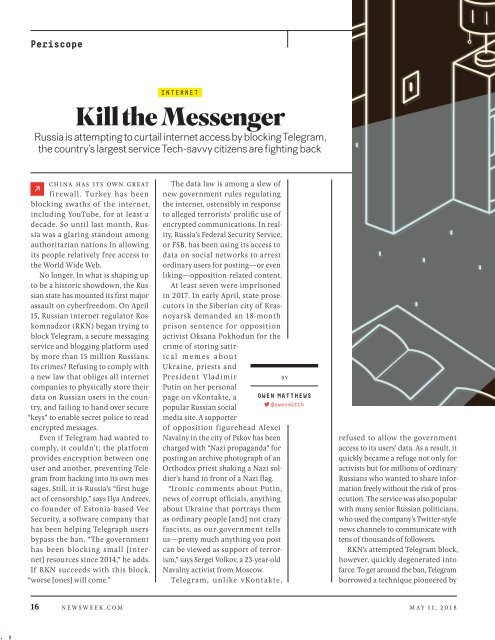You also want an ePaper? Increase the reach of your titles
YUMPU automatically turns print PDFs into web optimized ePapers that Google loves.
Periscope<br />
INTERNET<br />
Kill the Messenger<br />
Russia is attempting to curtail internet access by blocking Telegram,<br />
the country’s largest service Tech-savvy citizens are fighting back<br />
china has its own great<br />
firewall. Turkey has been<br />
blocking swaths of the internet,<br />
including YouTube, for at least a<br />
decade. So until last month, Russia<br />
was a glaring standout among<br />
authoritarian nations in allowing<br />
its people relatively free access to<br />
the World Wide Web.<br />
No longer. In what is shaping up<br />
to be a historic showdown, the Russian<br />
state has mounted its first major<br />
assault on cyberfreedom. On April<br />
15, Russian internet regulator Roskomnadzor<br />
(RKN) began trying to<br />
block Telegram, a secure messaging<br />
service and blogging platform used<br />
by more than 15 million Russians.<br />
Its crimes? Refusing to comply with<br />
a new law that obliges all internet<br />
companies to physically store their<br />
data on Russian users in the country,<br />
and failing to hand over secure<br />
“keys” to enable secret police to read<br />
encrypted messages.<br />
Even if Telegram had wanted to<br />
comply, it couldn’t; the platform<br />
provides encryption between one<br />
user and another, preventing Telegram<br />
from hacking into its own messages.<br />
Still, it is Russia’s “first huge<br />
act of censorship,” says Ilya Andreev,<br />
co-founder of Estonia-based Vee<br />
Security, a software company that<br />
has been helping Telegraph users<br />
bypass the ban. “The government<br />
has been blocking small [internet]<br />
resources since 2014,” he adds.<br />
If RKN succeeds with this block,<br />
“worse [ones] will come.”<br />
The data law is among a slew of<br />
new government rules regulating<br />
the internet, ostensibly in response<br />
to alleged terrorists’ prolific use of<br />
encrypted communications. In reality,<br />
Russia’s Federal Security Service,<br />
or FSB, has been using its access to<br />
data on social networks to arrest<br />
ordinary users for posting—or even<br />
liking—opposition-related content.<br />
At least seven were imprisoned<br />
in 2017. In early April, state prosecutors<br />
in the Siberian city of Krasnoyarsk<br />
demanded an 18-month<br />
prison sentence for opposition<br />
activist Oksana Pokhodun for the<br />
crime of storing satirical<br />
memes about<br />
Ukraine, priests and<br />
President Vladimir<br />
B Y<br />
Putin on her personal<br />
page on vKontakte, a OWEN MATTHEWS<br />
@owenmatth<br />
popular Russian social<br />
media site. A supporter<br />
of opposition figurehead Alexei<br />
Navalny in the city of Pskov has been<br />
charged with “Nazi propaganda” for<br />
posting an archive photograph of an<br />
Orthodox priest shaking a Nazi soldier’s<br />
hand in front of a Nazi flag.<br />
“Ironic comments about Putin,<br />
news of corrupt officials, anything<br />
about Ukraine that portrays them<br />
as ordinary people [and] not crazy<br />
fascists, as our government tells<br />
us—pretty much anything you post<br />
can be viewed as support of terrorism,”<br />
says Sergei Volkov, a 23-year-old<br />
Navalny activist from Moscow.<br />
Telegram, unlike vKontakte,<br />
refused to allow the government<br />
access to its users’ data. As a result, it<br />
quickly became a refuge not only for<br />
activists but for millions of ordinary<br />
Russians who wanted to share information<br />
freely without the risk of prosecution.<br />
The service was also popular<br />
with many senior Russian politicians,<br />
who used the company’s Twitter-style<br />
news channels to communicate with<br />
tens of thousands of followers.<br />
RKN’s attempted Telegram block,<br />
however, quickly degenerated into<br />
farce. To get around the ban, Telegram<br />
borrowed a technique pioneered by<br />
16 NEWSWEEK.COM<br />
MAY 11, 20 18


